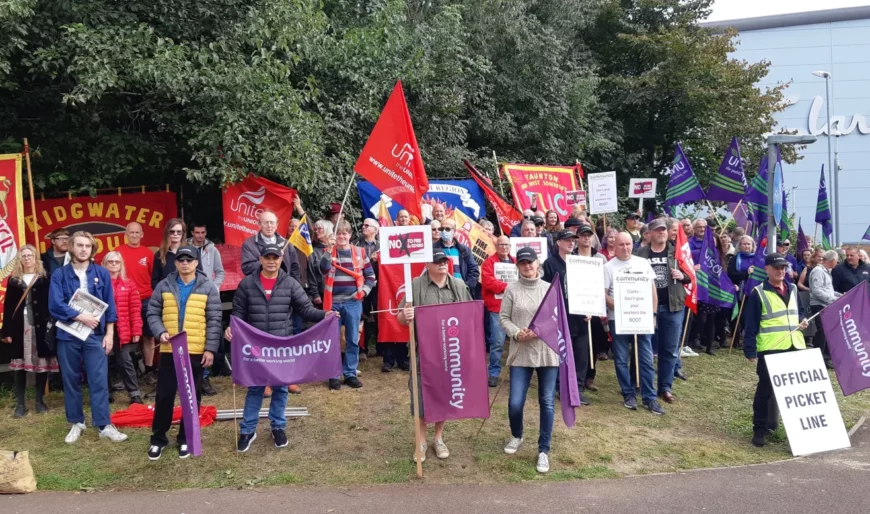Solidarity support for Clark’s workers
Case study

In October 2021 around 100 members of the Community union in the European Distribution Centre of Clarks in Street, Somerset voted by 88% for all-out industrial action to resist cuts to pay and conditions.
Clarks is a well-known brand but heavy losses were compounded when the pandemic hit global shoe sales. The business, established in Somerset in 1825, faced a financial crisis and was taken over by a £100m deal from the Hong-Kong based private equity firm Lion Rock Capital. The Clark’s family control had gone, although members retained board positions.
Clarks still dominates the small town of Street, physically and emotionally. Although the thousands of workers who used to manufacture shoes there are gone, the company’s HQ is in the town along with the Clark’s Shopping Outlet and a shoe museum. The lack of pubs in Street is put down to the Clark’s strong quaker influence.
The long history contains few industrial disputes and the workforce could do little to prevent the massive loss of jobs when manufacturing moved to cheaper production abroad. They did help secure the European Distribution Centre in Street despite its lack of proximity to the motorway network.
Led by the new private equity investors, the management proposed substantial cuts to pay and conditions and threatened to ‘fire-and-rehire’ the warehouse workers. The cuts would force workers, especially those with long-service, to face wage cuts from £11.16 to £9.50 an hour, along with loss of breaks, holidays, sick pay and redundancy terms. Some feared the loss of homes as they would not be able to maintain rent payments. Members felt betrayed by their employer. Some believed the management wanted to be rid of long-serving staff to be replaced by lower paid and more compliant recruits.
Community and Unite fought the proposals and the company resorted to the tactics of ‘fire-and- rehire’ to force the changes through. Barry Gardiner MP, who at the time had a Private Member’s Bill listing in Parliament to outlaw the practice paid Street a visit to show solidarity to the Clark’s workers and help promote his Bill.
Votes were taken by Community members in the warehouse and Unite members who work mainly in the offices. The Community workers would face the greatest losses and voted to strike.
The strike quickly attracted attention in the small town. The picket-line, at the entrance to the distribution centre, on a busy roundabout on the A39 attracted a lot of horn-hooting from supporting drivers. With daily support from Community officials, the workers quickly established picket-line rotas from 6am and organised the usual paraphernalia of picketing.
The strike was solid with just a handful of workers crossing the picket-line. Postal workers maintained their proud tradition and turned away. The warehouse continued to operate with the help of managers, scabs and agency staff.
As often in such disputes, individuals rise to the occasion. Trevor Stephens was the Community early shift rep who was the one who got up early to set up the picket-line, encourage others and speak up for the strike at every opportunity in the town.
The local Mendip Trades Council mobilised support and, led by ex-postal activist Dave Chapple, the picket line was bolstered by regular local visitors. Paul Nowak, TUC Deputy General Secretary, paid the picket a visit that helped boost morale and generate some focus on social media and other TUC solidarity support.
Media outlets picked up the story with good coverage locally as well as in the Metro and the Guardian.
A ‘solidarity day’ was called for Friday 15 October. The South West TUC helped spread publicity producing graphics for posters and social media. There was a good turnout and the event attracted regional media interest. Representatives from the variety of union contingents were invited to say a few words, to speak of their support but demonstrate to the strikers the breadth of solidarity being shown. The South West TUC interviewed pickets and supporters and quickly produced a short film for social media.
It was agreed to encourage supporters to join the picket line as much as possible but with the Friday afternoon as a focal point. Social media helped maintain the momentum. A special Facebook page was created that garnered a lot of likes. The dispute became an agenda item on many union meetings including the South West TUC Executive and Regional Council – even when Community reps weren’t able to attend themselves.
A financial appeal was launched and quickly built-up support for the generous strike pay from Community. Letters of support were encouraged as were letters to the employer. The CEO must have had quite a few including from Frances O’Grady TUC General Secretary.
Pressure was put on the local Conservative MP, James Heappey who wrote a letter to the union offering ‘individual worker mediation with the company’, whatever that might be. He condemned the strike and asked the workers to go back to work and talk to management.
The local council proved more sympathetic and wrote to the company in a helpful tone. A benefit gig was arranged in Bridgwater by Brian Smedley to raise funds.
Ways to maintain the momentum of an all-out strike were considered. Dave Chapple suggested the idea of a march through the town. The timing coincided with the build-up to COP26 before which a number of demonstrations were planned. So the best day looked like Saturday 13 November. Plans were made quietly without demoralising strikers hoping for an earlier settlement.
Nigel Costley, South West TUC Regional Secretary advised on organising such a march through a busy town centre. He quickly arranged a Zoom call with the police and union. It was clear that Trevor had thought through the route very well with safety the priority. Volunteer stewards were recruited, loud hailers arranged, etc. He arranged to walk the route with the police and deal with any concerns they may have.
Community arranged a small stage and PA system for a nearby park and began inviting speakers. It was agreed that Hannah David, the South West TUC Chair would host the post-march rally with speakers including Roy Rickhaus, Community General Secretary and Paul Nowak, TUC Deputy General Secretary.
The South West TUC and local trades councils spread the word through their networks, e-news, social media and appeals at meetings. Contact was made with Billy Bragg who gave a rallying call to join the demonstration at his packed gig in Bristol. A film was taken and clipped for social media.
Hong Kong solidarity activists in the UK, aware of the connections with Clark’s owners LionRock, sent a solidarity message to the strikers.
Some 400 marchers with dozens of union banners set off from the picket-line to march through the High Street passed the Clark’s headquarters. The support from the town was obvious and moving as shoppers and shop workers came out on to the street to applaud. Cars passing honked in support. The regional TV and other media outlets covered the historic event.
The rally heard from the invited speakers and others who rose to show solidarity. Dave Chapple concluded the event with a rousing speech expressing his pride with such a great turnout. All focused on the use of ‘fire-and-rehire’ by the employer.
Quakers in Street issued a press release welcoming the call from Frances O’Grady for negotiations to settle the dispute and declaring its opposition to fire-and-rehire.
Nigel Costley contacted South West ACAS to help bring a settlement to the dispute. Although they had tried to make contact a fresh effort was made and both sides agreed to use their conciliation.
After some difficult negotiations, often with Clark’s management in the US, a deal was reached maintaining current pay levels and some compromise on other conditions. Not a clear victory for the union – such outcomes rarely are – but a fair settlement that the members voted overwhelmingly to accept.





